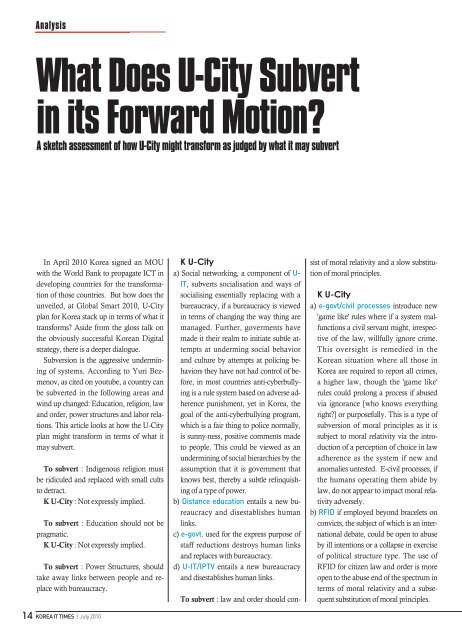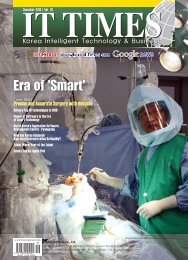2010-07 - Korea IT Times
2010-07 - Korea IT Times
2010-07 - Korea IT Times
Create successful ePaper yourself
Turn your PDF publications into a flip-book with our unique Google optimized e-Paper software.
Analysis<br />
What Does U-City Subvert<br />
in its Forward Motion?<br />
A sketch assessment of how U-City might transform as judged by what it may subvert<br />
In April <strong>2010</strong> <strong>Korea</strong> signed an MOU<br />
with the World Bank to propagate ICT in<br />
developing countries for the transformation<br />
of those countries. But how does the<br />
unveiled, at Global Smart <strong>2010</strong>, U-City<br />
plan for <strong>Korea</strong> stack up in terms of what it<br />
transforms? Aside from the gloss talk on<br />
the obviously successful <strong>Korea</strong>n Digital<br />
strategy, there is a deeper dialogue.<br />
Subversion is the aggressive undermining<br />
of systems. According to Yuri Bezmenov,<br />
as cited on youtube, a country can<br />
be subverted in the following areas and<br />
wind up changed: Education, religion, law<br />
and order, power structures and labor relations.<br />
This article looks at how the U-City<br />
plan might transform in terms of what it<br />
may subvert.<br />
To subvert : Indigenous religion must<br />
be ridiculed and replaced with small cults<br />
to detract.<br />
K U-City : Not expressly implied.<br />
To subvert : Education should not be<br />
pragmatic.<br />
K U-City : Not expressly implied.<br />
To subvert : Power Structures, should<br />
take away links between people and replace<br />
with bureaucracy.<br />
14 KOREA <strong>IT</strong> TIMES | July <strong>2010</strong><br />
K U-City<br />
a) Social networking, a component of U-<br />
<strong>IT</strong>, subverts socialisation and ways of<br />
socialising essentially replacing with a<br />
bureaucracy, if a bureaucracy is viewed<br />
in terms of changing the way thing are<br />
managed. Further, goverments have<br />
made it their realm to initiate subtle attempts<br />
at underming social behavior<br />
and culture by attempts at policing behaviors<br />
they have not had control of before,<br />
in most countries anti-cyberbullying<br />
is a rule system based on adverse adherence<br />
punishment, yet in <strong>Korea</strong>, the<br />
goal of the anti-cyberbullying program,<br />
which is a fair thing to police normally,<br />
is sunny-ness, positive comments made<br />
to people. This could be viewed as an<br />
undermining of social hierarchies by the<br />
assumption that it is government that<br />
knows best, thereby a subtle relinquishing<br />
of a type of power.<br />
b) Distance education entails a new bureaucracy<br />
and disestablishes human<br />
links.<br />
c) e-govt. used for the express purpose of<br />
staff reductions destroys human links<br />
and replaces with bureaucracy.<br />
d) U-<strong>IT</strong>/IPTV entails a new bureaucracy<br />
and disestablishes human links.<br />
To subvert : law and order should consist<br />
of moral relativity and a slow substitution<br />
of moral principles.<br />
K U-City<br />
a) e-govt/civil processes introduce new<br />
'game like' rules where if a system malfunctions<br />
a civil servant might, irrespective<br />
of the law, willfully ignore crime.<br />
This oversight is remedied in the<br />
<strong>Korea</strong>n situation where all those in<br />
<strong>Korea</strong> are required to report all crimes,<br />
a higher law, though the 'game like'<br />
rules could prolong a process if abused<br />
via ignorance [who knows everything<br />
right?] or purposefully. This is a type of<br />
subversion of moral principles as it is<br />
subject to moral relativity via the introduction<br />
of a perception of choice in law<br />
adherence as the system if new and<br />
anomalies untested. E-civil processes, if<br />
the humans operating them abide by<br />
law, do not appear to impact moral relativity<br />
adversely.<br />
b) RFID if employed beyond bracelets on<br />
convicts, the subject of which is an international<br />
debate, could be open to abuse<br />
by ill intentions or a collapse in exercise<br />
of political structure type. The use of<br />
RFID for citizen law and order is more<br />
open to the abuse end of the spectrum in<br />
terms of moral relativity and a subsequent<br />
substitution of moral principles.

















